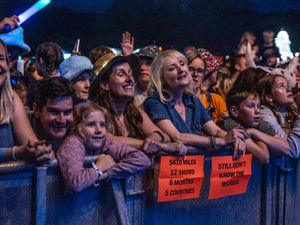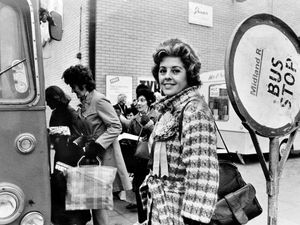Duke of Gloucester presents SVR volunteers with awards on Shropshire visit - with pictures
Volunteers at the Severn Valley Railway were presented with long service awards by The Duke of Gloucester after collectively clocking up more than 1,000 years service.
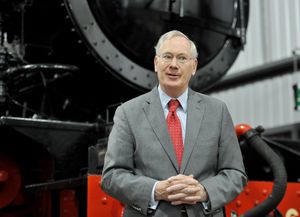
Prince Richard, who has been the railway’s patron since 1997, was then surprised with a long service award himself for 20 year’s service. He was also presented with a framed photograph of a locomotive called Duke of Gloucester from when it visited the Severn Valley Railway.
The Duke was also officially reopening Coalbrookdale Museum of Iron and the almshouses in Horsefair, Abbey Foregate, Shrewsbury.
He began his visit at the Severn Valley Railway in Kidderminster, where he boarded GWR Locomotive No 7802 Bradley Manor for the journey to Highley.
The group of 21 volunteers, including drivers, station staff, and carriage maintenance and restoration workers, were invited to the Engine House at Highley to be thanked for the many years of support.
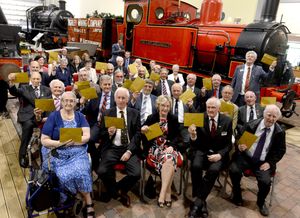
David Williams, chairman of the SVR company, addressed the volunteers before they received their awards.
He said: “You started working at the railway when it was completely a voluntary organisation.Today the railway is a successful blend of volunteers and paid staff.
“The railway could not be run without its huge volunteer force of nearly 1,800 members.
“It wouldn’t be viable without volunteers so can I take this opportunity to thank you all.”
The Duke of Gloucester presented each volunteer with an award.
He said: “It’s a great pleasure to come again to this wonderful railway.
“There are all sorts of commercial organisations that flourish but there are also organisations like this which couldn’t possibly flourish without the volunteers.
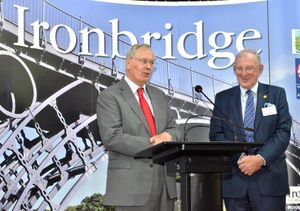
“It’s very special that so many of you are still here after 50 years. I suspect a lot of you already knew a lot about railways when you joined.
“Together we’ve maintained the railway, maintained the buildings, collected the engines. It looks like the next generation is going to carry on from strength to strength, so I congratulate all of you.
“It’s very important to me as your patron to know that this kind of support has been there for so long, so thank you very much indeed.”
Many of the volunteers played key roles when the railway was just an idea, and have watched it come to fruition.
Volunteer Tony Bending, who is from Bridgnorth, has been volunteering for the railway since July 1966.
The 71-year-old said: “I do a mix of work now, admin, I’m a director of both boards, and I still drive the trains occasionally. I do all sorts of things.
“In 1966 I started by painting buildings and weeding the tracks. It’s almost unbelievable, it’s something which I would never have dreamed possible all those years ago to be where we are now.
“I’m hopeful for the future of the railway, so long as passengers keep coming we’ll be ok.”
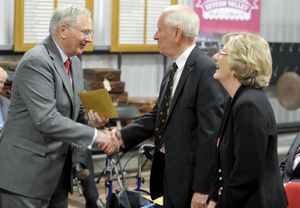
A couple of volunteers, Jack and Denise Bond, met when they started volunteering for the railway and have now been married for 46 years.
Mr Bond, from Codsall, said: “I turned up on opening day in 1966 and my wife came the day our first locomotive arrived.
“Already we knew each other by sight but things took off from there.”
Mr Bond, 76, still volunteers at the railway two days a week leading the maintenance team at Arley.
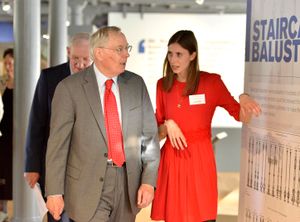
Mrs Bond, 68, said the volunteers are holding a raffle currently to fund a new workshop in Arley.
Mr Bond added: “We were all in our 20s, 30s and 40s when we started and now we’re in our 70s, 80s and some are even older. But we’ve got the apprenticeship scheme now which is essential.”
After having a tour of the Engine House, the Duke of Gloucester left the building as schoolchildren from Harper Bell Seventh-day Adventist School in Birmingham sang and waved flags.
The event was the second time that the SVR has welcomed the Duke in two years, following his visit in September 2015 to celebrate its Golden Jubilee.
Updates from the Duke's visit
Museum’s 50th anniversary ‘is a reason to start Gorge story again’
And so the Duke of Gloucester had the final word, and the fondest farewell.
After officially re-opening the Coalbrookdale Museum of Iron yesterday following its transforming refurbishment, he told assembled guests and those whose working lives are centred round this slice of history: “Windsor Castle was crossed off the list for World Heritage sites but Ironbridge got through.”
To the delight of his audience, he also said: “This 50th anniversary has given you an excuse to start all over again so that you appeal to all visitors as telling the Ironbridge Gorge story gets a new beginning.”
He has a long association with the Ironbridge Gorge Museum Trust and over the years has visited Coalport China Museum and the Hay Incline Plane, Blists Hill Victorian Town. In 1982 he opened the cover building protecting the Old Furnace on the same site as the museum. And so celebrating the trust’s 50th anniversary celebrations and appealing to the royal visitor’s architectural and historic background, heralded the cue for leaving the starting block on the next part of the journey.
The £15 million development programme Masterplan is intended to conserve its own history and inspire its future. And a royal visit is always a brilliant place to start.
Deputy chairman Gaye Blake-Roberts who is also director of the award-winning Wedgwood Museum, said: “Housed in the 1838 Great Warehouse at a time when Coalbrookdale ironworks was reckoned to be the largest in the world, the galleries explore over 400 years of iron making.
“The newly interpreted and interactive displays will provide an exceptional opportunity to examine and explore the wonders and the importance of iron through the centuries and reinforce the significance of iron making within the history of Great Britain.”
The royal visitor was also escorted by Lord Lieutenant Sir Algernon Heber Percy, trust president Michael Lowe, chairman Barrie Williams and chief executive Anna Brennand – who gamely helped guide the royal visitor despite a broken foot!
Seal of approval for new almshouse development
The Duke of Gloucester swept in to Shrewsbury to give the royal seal of approval to a new almshouse development which had been built in a tradition that stretches back more than 570 years.
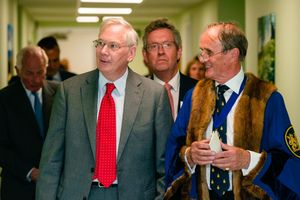
The almshouses in Horsefair, Abbey Foregate, have been built thanks to donations, grants and loans by the Shrewsbury Drapers’ Company, which has offered housing to poor, old and distressed people since 1444.
The development at Drapers Place brings to four the total of almshouses within Shrewsbury.
His Royal Highness is vice royal patron of the Almshouse Association and it was in this capacity that he had been invited to unveil a Welsh slate plaque, carved by renowned stonemason Ieuan Rees to officially open the £3 million development.
Building work began in late 2015 and the first residents moved in last Christmas.
Jan Boyd, clerk to the Shrewsbury Drapers’ Company, said: “We were delighted and honoured that His Royal Highness managed to fit us in to his busy schedule. He was visiting a number of places. He has an interest in almshouses and in architecture.”
The duke was accompanied by the Lord Lieutenant of Shropshire, Sir Algernon Heber-Percy and his wife Jane and met by the mayor of Shrewsbury, Councillor Jane Mackenzie, chairman of Shropshire Council, Councillor Ann Hartley, Anthony De Ritter and Blair Gulland from the Almshouse Association and Dr Ashley Fraser, chairman of the Shrewsbury Drapers’ Company and master of the Drapers Holy Cross Ltd.
Jan added: “This project was 19 years in the making. We had to jump through hoops with planners and various processes to get it done. The build was funded by money from the Homes and Communities Agency and Shropshire Council, £1 million in donations from the Bradbury Trust and the Garfield Weston Foundation as well as from our members in the Drapers’ Guild and a £1 million mortgage.”


